Joaquín Sorolla, “Mother,” 1895–1900.
Hi friends,
I hope this Mother’s Day finds you feeling nurtured and at peace. For the cover I chose this painting by Joaquín Sorolla, a work that l often think about since first seeing it in Madrid circa 1989. In this dreamy image of the artist’s wife and their newborn daughter Elena (that is my mom’s name as well) they float in a cloud of placid white linen. For me, its tenderness made me realize I wanted to be a mom, a testament that good art never leaves us. Years later, as a young mother nursing my daughter I often thought of this painting and its accuracy, there is nothing quite like that in-between sleepy, time -is-at-a standstill early days of motherhood.
And in honor of Mother’s day I want to share with you some wise words from Betsy Murphy: writer, performer, mother, grandmother, film maker, and writing mentor. She was one of the main reason I launched this Substack. An online writing workshop where she guided a group of us on finding, and sharing our voice was the catalyst to just start.
Charlie Griswold and his daughter Sunny Jane
In 2022 Betsy lost her youngest son Charlie, a pain that “can hardwire the body and mind to wake up in the morning but not want to be alive.” The book she wrote, both to find herself after his passing, and to find him in her writing is beautiful and heart breaking at the same time. To me it embodies the unconditional love of a Mother:
Click here on this link to purchase a copy.
“The morning after the July 2022 death of Betsy Murphy’s youngest son, Charlie, she began writing…the writing became a journey to unexpected healing spaces and shrines within.”
Another Betsy must-read is this article: “Reach For a Loved One Before They Reach for a Drug — A Mother’s Plea and Advice After Losing Her Son to Fentanyl.“ Please share with anyone affected by fentanyl poisining.
Betsy posted this poem on her social media, and it really struck a cord with me, especially the description of the compulsion to tell someone who has been through hell that they are “so strong” rather than holding space for them to collapse, if only for a day.
“The people who truly understand are the ones who have experienced the death of a child. The people who know what to say are the ones who have made time to learn about grief, PTSD, and trauma. They’ve cared enough as humans to have empathy for another’s experience.” -Betsy M. Murphy
Here is my conversation with Betsy:
Me: Betsy, through your work I have come to appreciate two things (among many): writing as therapy, and then sharing it with others to add a layer of community. The fact that you have been so prolific (a book, hundreds of social media posts, your essays on Substack, writing workshops, live performances etc.) though the worst year of your life has been a balm for many of us who tend to isolate through grief. Having read your other book I know that writing is how you have healed many traumas, not just the loss of your son Charlie. In addition, the activism and awareness that has resulted from all your writing has helped heal so many, as well as opening our collective eyes to so many issues regarding mental health and the cruel (mis) handling of fentanyl related deaths by the police. You are so honest in your writing, in your encouragement of others to tell their own stories, which brings me to thiS question:
While many people have the urge to write they often think twice about diving into the past, partly due to the cultural (and familial) taboo surrounding the "airing out of dirty laundry." (Can we talk about the already negative bias implicit in qualifying trauma as "dirty") In one your workshop someone asked how to write truthfully knowing that you will piss off, potentially hurt, or embarrass family or friends? This is a loaded question because it contains shame, something many people have internalized in families where secrets and appearances trumped the truth.
Betsy:
“I believe in doing no more damage. If you are writing the truth to hurt someone or to get back at someone, you should write that story, get it out of your body and mind—and then leave it. Don’t press publish. If you are writing the story to tell the emotional truth about your life and it includes someone close to you who hurt you, write that story without trying to get even. Write that story in a way that calls in healing, understanding, and compassion for yourself and others. And instead of thinking about what’s the worst that can happen when you tell your truth, focus on what’s the best that can happen. It’s odd that we’ve been convinced that telling the truth is a bad thing. “
**Bonus track: Here is an essay from her brilliant Substack where Betsy advises us to “remember that you aren’t telling the family story, you are telling the story about your experience within the family."
Me: Before Charlie passed you were semi-nomadic (a personal goal) and known to your readers for traveling the world with one suitcase to teach retreats, do humanitarian work in Zimbabwe, etc. For someone who is so detailed in their writing, who describes past memories and events with such humor and clarity, how did you let go of all material goods and get down to one suitcase? More importantly, now that you are based primarily in California do you feel "at home?"
I think we could write about the notion of home for days...
You recently shared an image of Charlie in Northern California I thought, for someone who loved water, he sure radiated joy with those horses out there in the mountains.
Can you speak of "place" and grief. It seems land can hold so much space for grief. I find when I visit certain places that I know were loved and cherished by people who have passed I feel their presence. The places that bring us “glimmers” that hint at another world and an after life, just as you describe in your book. It is not a coincidence that every culture has rites and rituals returning the deceased to the earth, or in the case of India to the water.
Betsy “My home wasn’t released by choice. I’d been given a home for myself and my children to live in that I believed it was in my name. In November 2014, I arrived home after a trip to everything packed up and stored in the garage. The house was empty. I had to take a horrible situation and make it work for me. Looking back, I now see my willingness to so easily purge after that was not the move of a spiritually enlightened woman, it was a trauma response. Like so many woman who have been in abusive situations, I smiled and acted like everything was okay. I also had a small condo I rented in Miami Beach and I discovered that needed to be vacated for good due to a mold issue. It was all in the same week. Suddenly I was without a home base. That’s when I looked at something potentially bigger at work.
I grew up in a family where my parents collected antiques. It was a beautiful home but I was always surrounded by other people’s stuff. Later in life, after each of my moves, I wanted less and less around me. Just family photos and nice linens were enough. It’s always been easy for me to live out of a carry-on suitcase for months. That gift is probably a trauma response, too! I did notice the further away I got from home (Indiana), the more I felt at home. The roots of my son Charlie’s trauma also began in Indiana. He came out to California when he was seventeen and only returned to Indiana 2-3 times in ten years. Taking his ashes to the Ganges River in India was a way to return him to a place that treated death as sacred.”
“Varanasi is the city of death where millions make a pilgrimage to offer ashes of the dead to the holy Ganges River with hope for salvation. A year ago I offered my son Charlie’s ashes to the Ganges on February 25th. This year I returned and immersed my hand into the Ganges on Feb. 25, 2024 to feel the connection to the peace and salvation Charlie was searching for in the last few years before he died at 27.”
Me: And this brings me to India and the subject of your pilgrimage and upcoming film...
Let me begin with one sentence (all of your writing is beautiful, highlight one is pretty tough) that really struck a chord, you asked (I am paraphrasing)
"who are the safe spaces (people) who can witness our sadness/grief pain?"
Your answer was about writing as a safe space but this got my head spinning. After my daughter's father and my former husband died suddenly I received so many stupid and hurtful questions and comments from people that it made me want to crawl into a hole or punch them in the face. I know sudden and tragic deaths make people uncomfortable, but I think we need to establish some guidelines for folks. One question in particular which haunted me, especially when there is a death by suicide, is "how did he/she do it?"
I remember an old college roommate who I had not spoken to in years calling me a couple days after Neal passed to ask me this question, right off the bat. She was from Ecuador, a society that really loves a good chisme (gossip). I did not have the strength to tell her to mind her own bloody business so I sat there, stunned in uncomfortable silence and changed the subject. I have to say the worst question and comments in the early days of grief all came from people who were not close to me. All of a sudden, random people came out of the woodwork to trigger hypervigilance (often inked to a deregulated nervous system caused by traumatic events or PTSD) in the guise of “concern.” The comments and impertinent questions had more to do with their incapacity to hold grief than empathy or concern. But enough about me, I know you have touched on this in your writing many times…
Betsy: I appreciate you sharing your experience. I was also stunning at the random people contacting me offering condolences while also wanting details of Charlie’s death.
When someone asks me how he died, I suggest a better question is to ask me how he lived, what did he love, what made him happy.
Charlie and Harley have two young girls, Sunny and Ray, who were 5 and 4 when he died. Seeing your girls thriving now as teenagers and young adults gives me hope for Sunny and Ray. I know it hasn’t been an easy path for you. I have a great deal of compassion for anyone who ends their life by suicide. For Charlie, it wasn’t him having one bad day. He’d had years of unhealed trauma that can rewire a body and brain to not feel safe in the world. He did his best to try and heal while he was alive so he could show up for his girls. His trauma was complex. I know he is healed now.
Betsy I want to really thank you, for sharing Charlie with so many of us. And for also sharing Harley, Sunny and Rae, seeing pictures and reading stories of the girls is a constant source of joy and hope for me. In them I see my own girls who also lost their dad too soon. Seeing their milestones, birthdays, and holidays reminds me of that constant refrain "I wish their Dad could see them, he would be so proud." And this is where faith enters the picture, because I think Charlie and Neal are always with their girls. I always tell them to look closely for signs: the red cardinal they spot when they are sad, the monarch butterfly that flies by, the Grateful Dead song that comes on the radio... Again would love your “Gogo” advice on trusting those signs and where to look.
Charlie’s daughters Sunny, Ray and their (river) mommy Harley
The girls have been my biggest teachers on how to connect and trust. The song Blackbird will forever be the song that reminds us he is still around. Charlie comes to his girls in many ways. For Sunny, it’s through her art, it’s like she’s channeling him. She calls him Angel Daddy and draws him floating with wings and a smile. For Ray, she finds connection to her dad through the sun. On sunny days, Ray often sits outside and talks to her dad. For me, I connect to Charlie through writing. I love that you remind your girls to just be present and notice.
Thank you Betsy. And now a pic of my stunning mom, Elena. I am so lucky to be spending the day with her, but I will be missing my very grown up adult daughters.
Sending love to my mom, and to all who celebrate today, and if today is sad or difficult for you, I am sending you extra love.
xo, Vero


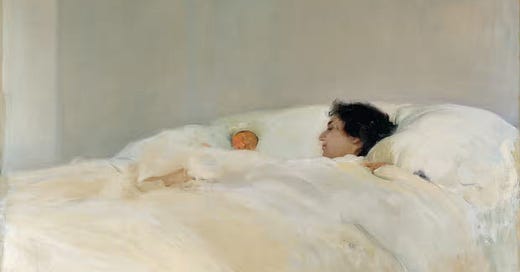




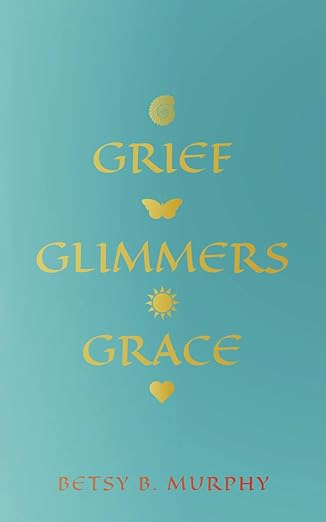

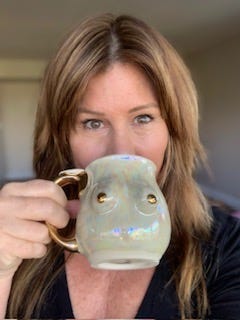
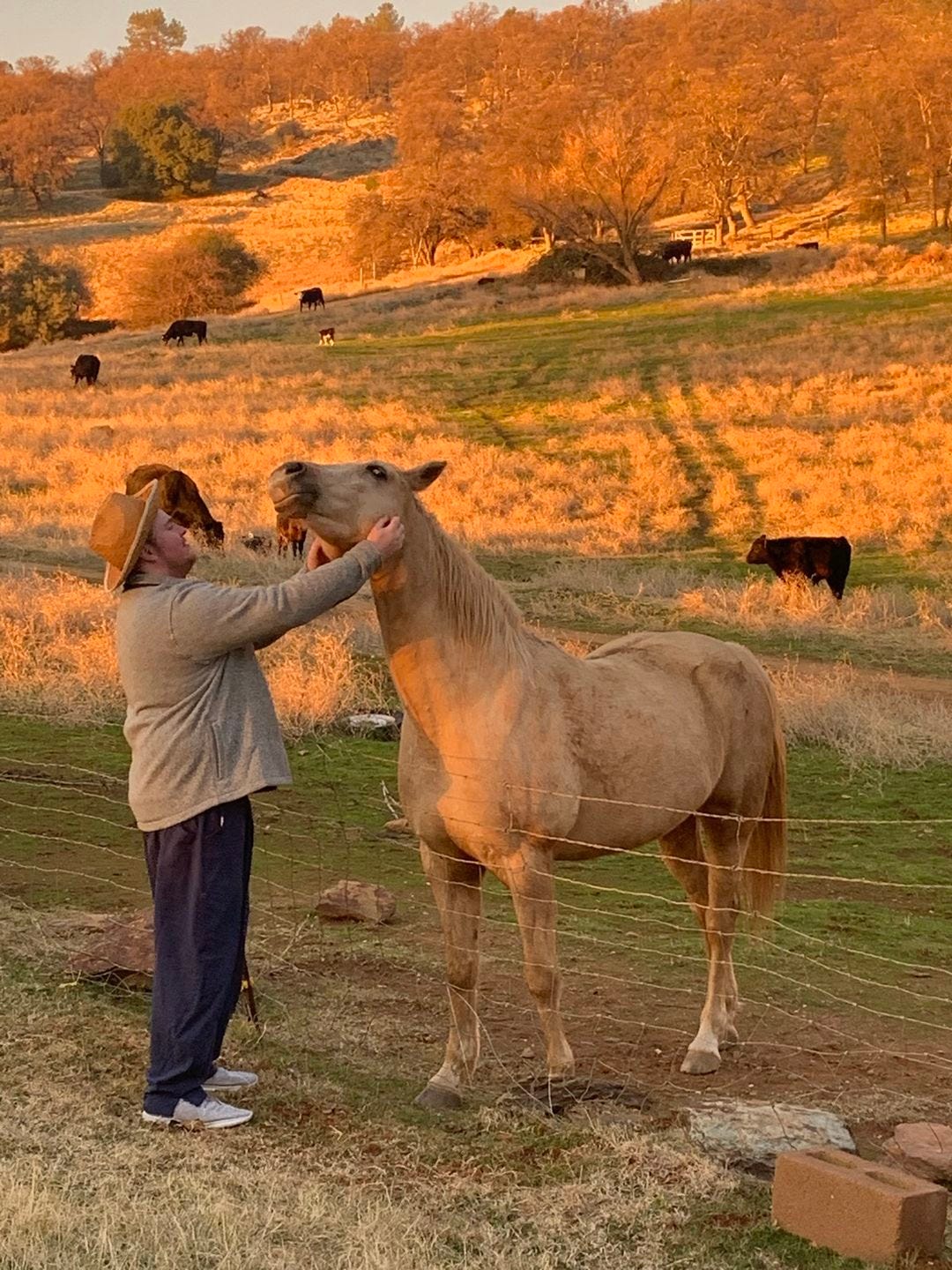
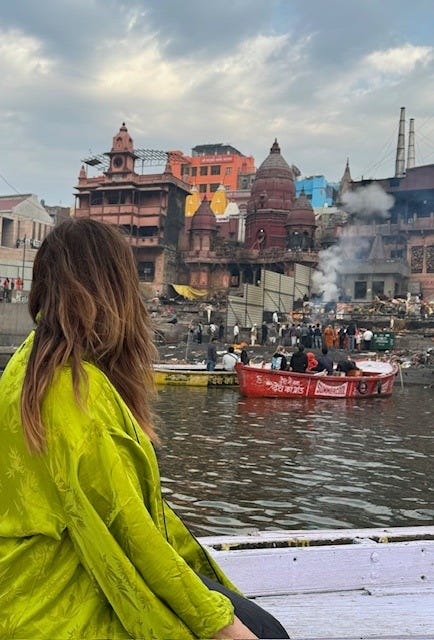
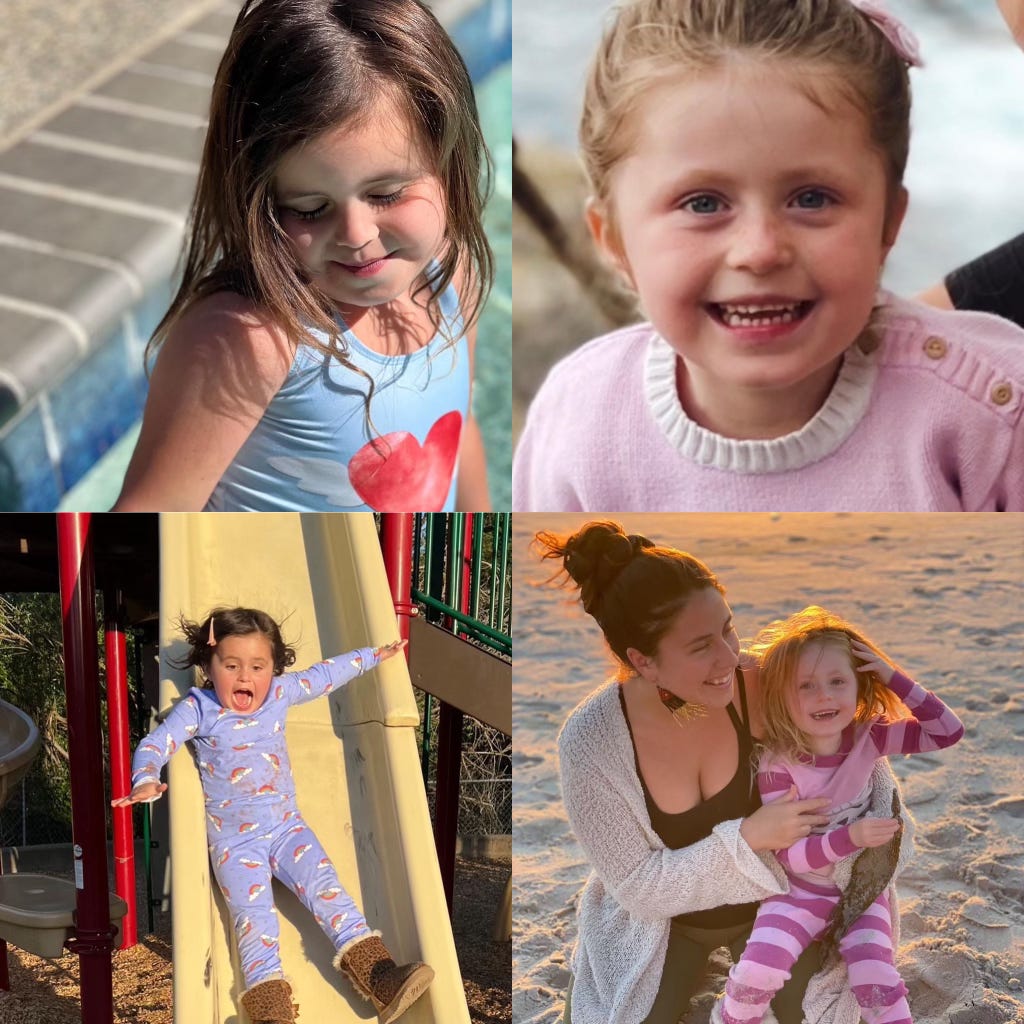
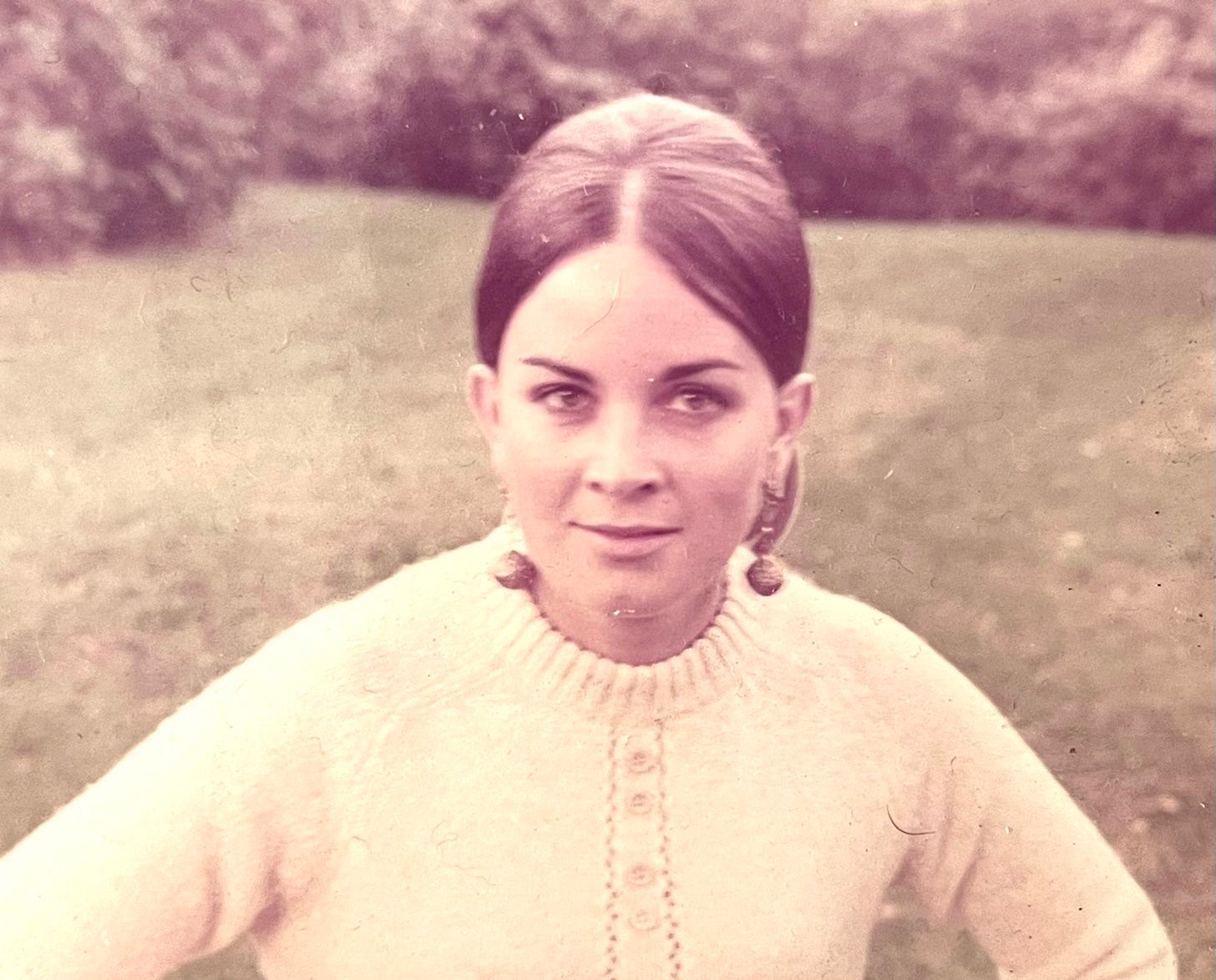
Beautiful conversation. Good words here. Thank you for sharing it with your readers. It has been my experience as well that suffering, becomes the basis for durable hope.